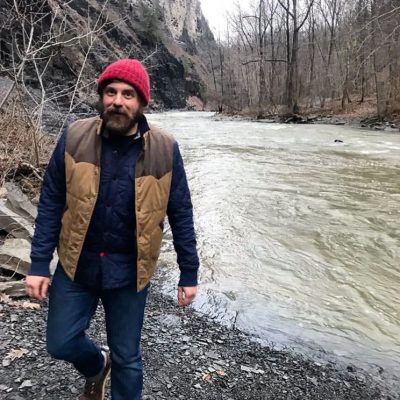Student Spotlight: Remy Barnes

March 4, 2019
Remy Barnes is a master of fine arts student from Tallahassee, Florida. After earning his undergraduate degree at the University of Texas at Austin, he came to Cornell to pursue an M.F.A. in fiction.
What is your area of research and why is it important?
The commonality between my various pieces of fiction is, in general, geography: almost all of my work takes place in the American South and the thesis (novel) I’m working on, without saying too much, concerns a family’s grieving process while a hurricane heads their way.
What inspired you to choose this field of study?
With fiction writing, you’re trying to transmogrify the personal into the universal by virtue of lying. When I was young, I lost a parent. Not many of my friends had in the way I had so I felt like I was always sending signals out to try and find other people who’d experienced my grief. I guess I’m still trying. Also, I like to lie.
Where did you study with your Graduate School Research Travel Grant?
My original intent was to head to Texas and Louisiana but the novel-writing process is fluid and it turned out the bulk of my new draft now takes place in Florida. So I went to Tallahassee, visited Florida State University, and was given access to their abundance of archival hurricane photographs, news, and meteorological reports. Most importantly, I accessed a little-known but incredibly influential master’s thesis written on the Hurricane of 1928, which caused mass flooding and fatalities (of mostly poor workers of color) in Central Florida which led to the levee around Lake Okeechobee and current drainage methods in Florida.
How important was obtaining a Research Travel Grant for your research?
Without the travel grant, my thesis would be missing integral information for the building of verisimilitude. While so much of the writing process takes place in the mind, in a room, and while you’re alone, field research can prove to be invaluable to a work-in-progress. For me, this was the case as, since my trip, my thesis has taken a new and important shape.
What did this grant allow you to do that you might not otherwise been able to?
In addition to my research at Florida State, I also travelled to Mexico Beach and the surrounding areas to witness the aftermath of Hurricane Michael first-hand. I took photographs, notes, and spoke with people there, heard their stories and their thoughts both personal and, perhaps unsurprisingly, political as well. These weren’t just vacation homes that were leveled as many people there lost everything. We often forget, especially when the cameras stop rolling and the media leaves, how natural disasters disproportionately affect the poor and people of color and I hope I can, in some way, illuminate this through my thesis.
What are your hobbies or interests outside of your research or scholarship?
I’ve been known to avoid playing the guitar. I also enjoy hiking, which, lately, has turned into snowshoeing.
Why did you choose Cornell to pursue your degree?
The Cornell M.F.A. program is nearly unmatched in terms of the time and resources offered—the two things, in my opinion, writers require the most.
